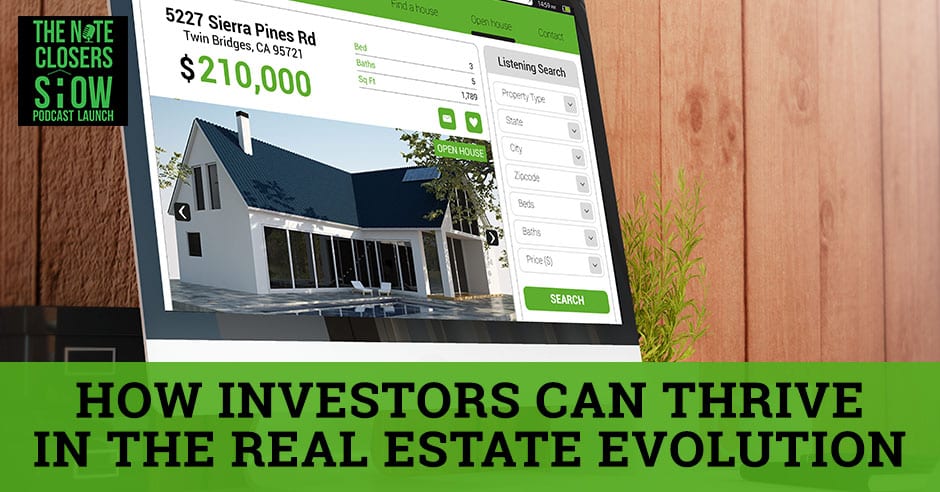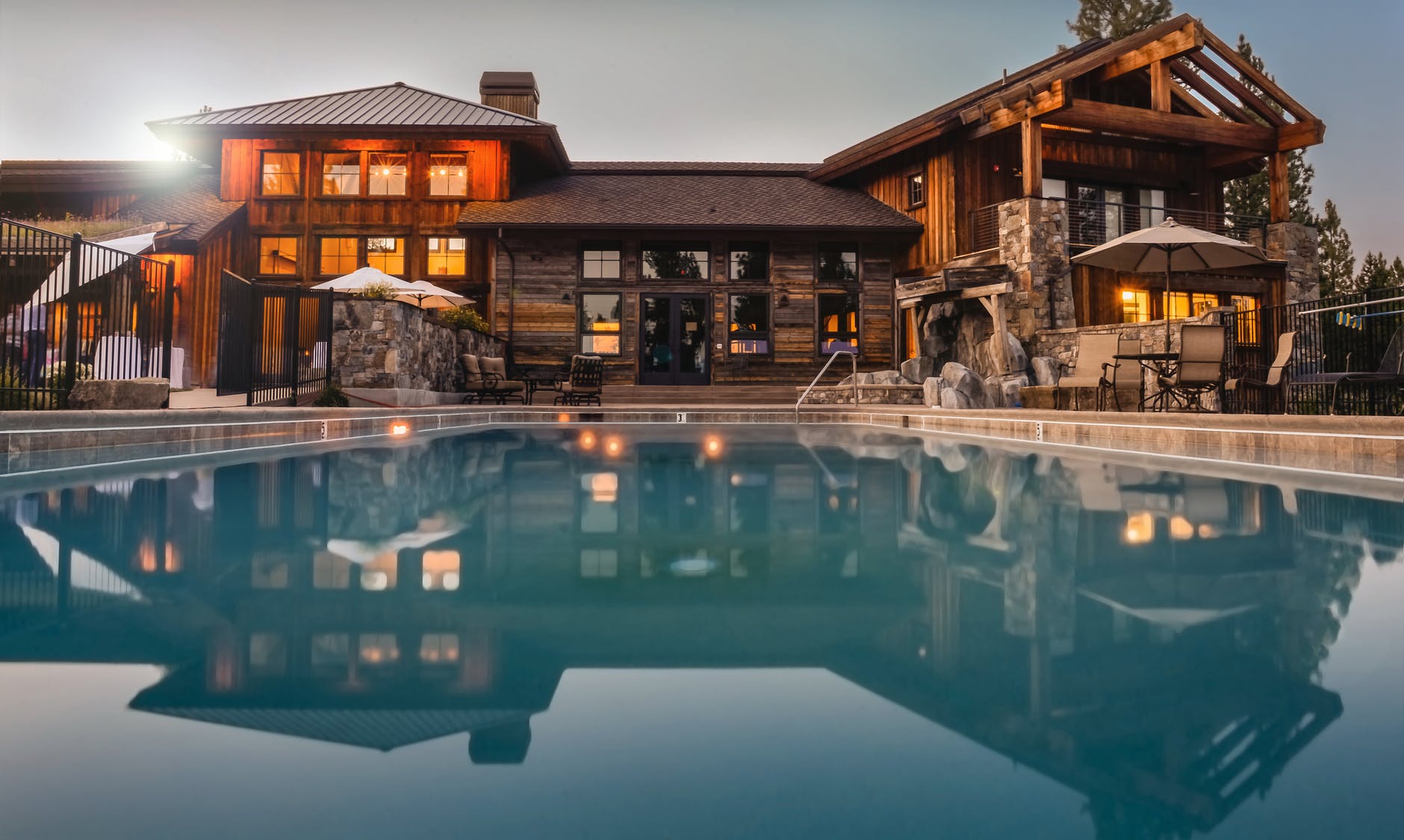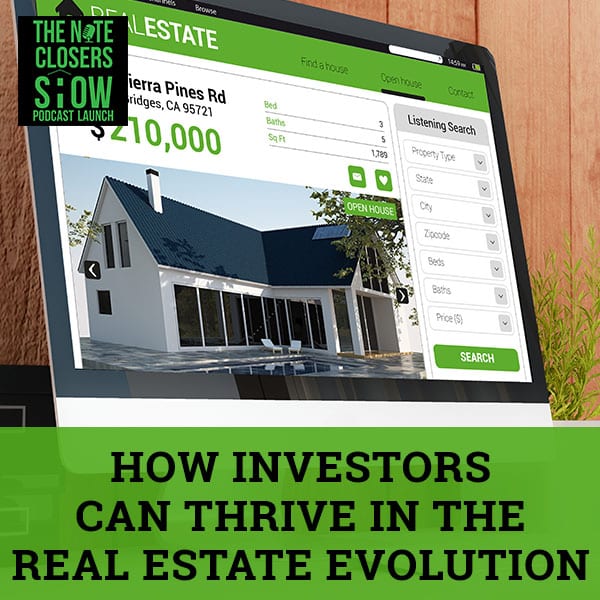
The real estate evolution is underway. People aren’t showing up as much as they used to when it comes to real estate investment clubs. Well-established groups are seeing a decline in attendance. It’s hard to put butts in seats at events and that’s unfortunate – but there’s a lot of contributing factors. One, you’ve got to work constantly to market to people and to communicate with them. A lot of investment clubs are still doing the same thing that worked for them decades ago, but what they refuse to admit is that you’ve got to evolve and use technology. Real estate investors will only evolve as they grow in experience and knowledge. It’s a hard pill to swallow, for sure, but if you truly want to succeed – or even survive – you need to learn as much as possible from this generation.
—
Listen to the podcast here
How Investors Can Thrive In The Real Estate Evolution
I spoke at the TREIA, Real Estate Investors Association that had about 200 plus in the room, which is great. It was nice to speak to a packed audience. They’re just under a thousand members in total. It’s always nice running into people. It’s definitely great to see one of our Mastermind students, Natasha Hunter. It was good to see her. There are only two people that have even heard of me at that group. It was nice being at an event and speaking to a fresh audience. Natasha and another guy have heard of me, but only one other person has listened to the podcast before. We’ve seen a boost in listening from that area. It’s always great talking and networking with people, especially real estate investors. I always enjoy the chance to speak and give my little plug out.
One of the things I’ve always noticed, I was talking with the advisory board, the people that run the club, is they are much like a bunch of other real estate clubs. They’re having a slowdown in attendance, they noticed. They’re having a lot of registrants, but people aren’t showing up as much as they used to. I hear that from a lot of real estate investment clubs. I hear that from big groups that they’re seeing a decline in attendance. I see that in speakers all the time talking about that, where people are putting on events. It’s hard to put butts in seats at events and that’s unfortunate. A lot of that comes from one or two things. One, you’ve got to literally work constantly to market to people. You’ve got to work constantly to communicate with them on different levels. A lot of investment clubs are still doing the same old, same old. They’re doing the same thing as they were doing years ago. You’ve got to evolve and use technology. I was asking the club presidents there, “Do you ever do live streaming in the studio? Are you recording this and promote this to their website?”
First of all, the club didn’t have an Instagram account. The club has a decent website. It could be updated. They’re not doing anything online. I hardly saw any social media posts. I’ve seen little activity from the group. They’ve got to realize they’ve got to boost it and talk with the group members. They’re an older crowd and there’s nothing wrong with it, but there’s an age gap between the old guard and the new guard coming aboard. There was a lot of great people, really warm crowd, responsive. They asked a lot of questions, which is nice, but I see a gap in a lot of things taking place. This is happening more and more across the country. More and more real estate clubs I talked to or talk in front are not communicating effectively. Email is a great way to do it, a meetup group is a great way to do, a website is a good way, but if you’re not sharing what’s going on, it’s difficult to do that. You have to evolve. That leads me to do this discussion of what this episode is all about. It’s about the evolution of the real estate investor. It’s the evolution of what are we doing? Where are we going? Where have you come from?
The thing that I want you to realize is that we all grow as investors. We all start off somewhere brand new and hopefully evolve over time. There are a lot of people that I’ve known that have evolved a little bit and then get stuck in one thing and they don’t grow as individuals, they don’t grow as investors. You have to look to grow to take your business to next levels or evolve as the market changes. One thing I was listening to at this investment club, and I listen to lot of investment clubs, I hear people all the time saying, “I can’t find deals. It’s too tight. It’s too expensive.” When I asked that, a lot of people raised their hands about things and I’m like, “What are you doing to market or to tweak the things you’re doing?” If what you’re looking for is drying up, you’ve got to evolve or what is going to happen? You’re going to starve to death or you’re going to die as an investor. You can’t do that. That doesn’t work. You’ve got to evolve. You’ve got to learn to evolve as an investor.

Real Estate Evolution: We all grow as investors. We all start off somewhere brand new and hopefully evolve over time.
Where do most people start off? When we all started off, we’ve got to learn. We get education, we got to learn. Education is going to local investment clubs, watching videos, jumping on webinars, going to educational events and learning the different topics. That’s the first point. A lot of people like to put the idea of, “I have a different tool in my tool belt.” I get it. You start off like that. I was talking to somebody, “Who’s been one of your better speakers?” “We had such and such coming and doing a lot of stuff.” I’m like, “Okay, yes.” He’s going to do a lot of stuff that tells me about your group because you’ve got a lot of newbies because this guy teaches a lot of wholesaling, plus a lot of options, plus doing a lot of things to start off with to make things. It’s one of the ways that I learned early on.
You have to evolve. If you’re only holding your people at the base level of stuff and never evolving doing advanced technologies or taking advantage of what’s going on in the market, you’re hurting yourself. I only say that as a true entrepreneur, who’s evolved over time to do a lot of things and we have another evolution that we’re working through right now too. You go to all these things and the first place that everybody starts off at, besides education, is wholesaling. Why do people like wholesaling? People like wholesaling because it doesn’t require any of your own funds. There’s no commitment. They can often walk away if the deal doesn’t work out. It also allows them to try to feel if you’re doing something. “I’m marketing or I’m advertising this deal that’s for wholesale deal.” It’s unfortunate that a lot of people still don’t market effectively when it comes to that base level. By marketing effectively, I mean knowing the true numbers of the deal. Many of you guys that follow us or follow our tribe and we’ve got some people and some characters in here that drives me bonkers, drives people like Dan Zitofsky bonkers, everybody goes bonkers when people go, “I’ve got a deal.” “What are the numbers? Why don’t you know the numbers of the deal? Is it really a deal? A house is only going to be worth $100,000? Have you put $40,000 into it and you want $60,000 for the deal? That’s not a deal. Those numbers don’t make sense.”
Wholesalers is where we start off with. I started off wholesaling. Yes, I was trying to make $500,000. I’ve had some big wholesale deals over the years and I still wholesale notes occasionally. That’s where everybody starts off at. It’s the easiest thing to put something under contract, sell to somebody else, especially if you’ve got a coach or something else, hold your hands that they can help you out with marketing with that. That’s a great place. What you should be doing with wholesaling is you should be making money but also putting a little of that money in reserve. Put a little money in savings. If you’re putting everything in to pay your bills, you need to either increase your activity or you need to start marketing a little differently or for different deals.
If you’re driving around looking for other properties or driving around looking at other wholesale deals, it’s too incestuous. You’ve got to expand, especially in today’s market and today’s world. You’ve got to really get out, especially since our markets are very tough like Austin here. I can remember years ago, there are very few wholesalers that were here that had some big lists of stuff like that. Now, you don’t see that much available because everything’s overpriced for the most part, unless you’ve got a pocket listing or pick up something in probates or something like that and your marketing to a list of equity owners or out of state owners. You still got to get very creative. Wholesaling is the first thing. Next thing a lot of people look at is subject 2s. Wholesaling options are saying put something under an option agreement until it runs that market off.
Next thing a lot of people like to do is subject 2 deals. This is where you find something that has a low mortgage payment. Maybe they’re behind on payments or they got a preferential loan in place. The thing you have to keep in mind with subject 2s is hopefully, they don’t have too much in arrearages or they’re too far behind their mortgage to take that over. Subject 2 deals can be a phenomenal way of buying something that’s got a great rate on it, take it over, slip it into the existing financing. Hopefully, you don’t have to pay too big lump sum to either the existing borrower, the person who owns the property for you to take it over. A lot of times people walk away. The whole idea is basically arbitraging between that existing mortgage, that subject 2 deal and finding something. Hopefully, the property has a higher market rent rate.
I’ll give you an example. Let’s say it’s worth $120,000. The mortgage was for $90,000. Mortgage payment’s $600,000, market rent’s $1,200. Maybe you can find somebody to come in and buy and turn it into a rental and you’re making $600 a month, or you owner finance it to somebody. Do a wraparound mortgage and then you’re making a difference between their payment and your payment that you’ve got to be paying the subject 2 to your bank. Subject 2s can be a great way to make money doing a lot of deals. We do, I guess you’d say, the reverse with this being in a bank. We’re allowing our borrowers, especially some of these contracts for deeds, to let other people take over the mortgage, let other people assume the mortgage. If I was a new real estate investor, I could buy me a wholesale production. I would be looking for people that have taken over subject 2. That’s the evolution. You go from wholesaling and options to subject 2 deals. You’ve got to be a little fancier, a little bit more marketing. Reach out to people to wrap around your existing mortgage with taking things over to the next phase. The next evolution is light rehabs. Try something you want to put pink carpet on. Pretty much pretty houses. You don’t want to do a lot of heavy rehabs when you’re brand new because you don’t have a lot of experience. Light rehabs, you can still use hard money for funding these things. We’re going to be buying assets for the most part. You’ve got to have funding, whether it’s private capital, or hopefully the property can qualify for hard money.

Real Estate Evolution: You don’t want to do a lot of heavy rehabs when you’re brand new because you don’t have a lot of experience.
What is great to see was when I was in Raleigh-Durham, as I saw the guys from Longhorn Investments, Mel Keiser out of Dallas and our friends at that neck of the woods. Being a hard money lender in Charlotte is laughed at. I see a lot of hard money lenders. There are a lot of money in the industry right now trying to be deployed because there’s so much of it out there. They’re trying to finance a lot of things. I struggled with that. Doing small rehabs, paint, carpet, nothing too heavy, is the next evolution for real estate investors. Do that. You want to be looking at your assets being on or off the market within six months preferably. If you’re buying something where the days on market are over 180, 210 days, you’ve got to be careful that your pricing and your money cost don’t eat up most of your profits. A lot of people forget that your interest rate and your hard money loans, 10%, 12%, that can be a nice chunk of your profit that drags onto a year.
The next phase from that, from doing the light rehabs will be going to heavier rehabs. Cut your teeth on the light stuff. I will give an example. I was talking with a big investor in Houston and he said, “We found out when we do some rehabs, about 75% of our business comes from wholesaling. We saved the nice rehab projects that we know we’re going to hit home runs with for the ones we focus on.” My buddy, Brian Chandler out in Washington DC, is doing a lot of that stuff. He’s wholesaling. He gets a lot of leads in that DC, Baltimore area and wholesales a lot. Often, the ones that he knows that are within roughly an hour and a half hour from his office is what he focuses on as far as the rehab stuff of things. You don’t want to be doing rehabs all way across the country unless you’ve got family, you’ve got a great crew, and there’s somebody you trust.
Most of the time, you want to do your stuff where you can see that stuff because a lot of the contractors will eat you alive. Vendors not showing up on time or showing up late or not doing a complete job. You have to be very careful. If you’re going to be doing rehabs, how many rehabs do you have to have a full-time GC to help you out on this? You’ve got to have a full-time team to help you when you’re doing stuff. If you’re traveling across the country or buying multiple markets, trying to have your rehab across the country, they will eat you alive. It’s not something you’re going to enjoy. You will lose money and you don’t want to do that. Trust me, I know this. A voice of experience here. Stick to one or a couple of markets for your rehabs. After the heavy rehabs, then you go into the commercial side or lending side. Commercial can be great. There are so many little niches inside commercial. You want to make sure and specialize. You don’t want to try to be Jack of all trades. “I’m going to do a strip mall. I’m going to do some raw land development. I’m going to do an apartment complex or I’m going to do whatever industrial.” Focus on one niche. If you’re focused on one, you’ll be the happiest when it comes down to things. There are a lot of different things and commercial is a big boy game.
It’s not a, “I’m going to send it out on an email and blast it out and find a buyer for the deal in six hours.” Most of your commercial projects are going to take a couple months of negotiation, a month or two due diligence, and going from there. I’ve got people on there before like Martin Science talked about how he finds industrial complexes around the Arlington, Virginia area and he sells those off to other people, gets owner financing then wraps around the existing financing or subject 2 financing. That’s a great plan. You just got to be careful in commercial that it’s not overpriced, it’s not going to be a lot of work and stuff. I see people that dive into commercial right off the bat because that’s the where they want to go. “I want to do the big thing. I don’t want do any of this other stuff,” and they bomb because they don’t have the experience. They don’t have the reserves. Commercial’s a big boy’s game.
You’ve got to expect to put some money out on due diligence, repairs, and things like that. That’s why often, people will jump on the lending side. Certainly, any money out either, some mezzanine, short-term financing, three to six months or doing some hard money stuff. They become the lenders and they are getting the paper game at point. That’s why note investing, the people that are buying debt is the most advanced, most evolved investor animal. The fact is that we understand all that other stuff going on and we understand the numbers, what’s going on and where the debt game is and be able to negotiate that debt with the bank, the hedge fund, and all that stuff.
That’s why I would like to say that note investors are the most evolved Homo sapiens out there. The thing about it is transition. When I was speaking, I asked, “Who’s doing this? Raise your hands.” Seeing the evolution as the number gets smaller as it goes up that scale. As you evolve, that number becomes less and less. Your competition becomes less and less. Why? People get stuck and only, honestly, 5% to 10% of people will do anything, any point or any way. I had somebody talk, “Isn’t there a lot of competition since you’re out there speaking and others are speaking?” No, not really. Only 5% to 10% of people will do something. If they don’t do something, it’s not my fault. That’s why I always try to work on speaking, try to give as much information as I can to let them understand that it’s not as complex as most people like to make it out to be. For those who’ve been around, does that make sense? If you’re still trying to wholesale and you’ve been doing this for a couple years and you’ve still never wholesaled anything, you’ve got to change your tactic or change what you’re focused on. If you’re running around attending events, there’s nothing wrong with attending and getting an education, but if you’re not taking action, you’re not helping yourself in any form or fashion. By action initially, I did a lot of things when I started, door knocking, driving along the ugly houses, I sent yellow letters, postcards. I still get yellow letters to this day from people who see some of our vacant homes in the process of foreclosing on or selling.
I see a lot of stuff. They’re pulling lists and sending things out and then hoping that somebody will bite on that thing. You have to look at it. If you’re investing in a market that’s tough like here in Austin or Southern California, you’ve got to get creative or you may want to look to outside markets or sub markets to make things happen. We only had Alia Ott and Terri Garner who handled the self-storage side, they were mentioning that that they’re not buying a lot of their stuff in primary markets, it’s secondary markets, markets that are a little bit smaller than the main areas because they’re finding deals there.

Real Estate Evolution: If it’s a free event and there are tire kickers there, it’s not a good result.
There’s not as much competition there, unlike Dallas, Houston, Austin, San Antonio. Those are four major markets here in Texas. A lot of competition are taking place, especially a lot of people in San Antonio. I’ve seen investors coming from Austin to buy there because Austin’s overpriced. A lot of people from Dallas are moving to Fort Worth, or people in Austin are looking to Houston and vice versa. The thing to keep in mind everybody is as you evolve, your markets are probably going to evolve to find something that makes sense to identify our allies, if that makes sense, and of course ROT, return on time. The last thing you want to do is bust your ass and send out a lot of mailers, do a lot of marketing, only a couple of leads. You have a couple of weeks for stuff like that.
We have a question here, “Any particular reason you went to this event? I know you’ve got a lot of invitations. Just curious why you chose this particular one.” I’ve got a lot of invitations to speak. I turn them down for a lot of reasons. When I’m looking to speak somewhere, usually I only go to something that’s at least where they have consistently 100 people show up or more. It’s also got to be an investment club that charges either monthly or annually. Free meetup groups, free investment clubs, are not worth going to. You have a lot of tire kickers there. There’s no investment by the members. If I’m going to take my time to go out there and then offer up our workshops, I want to make sure that there are valuable buyers there.
People that will buy at the workshop are who have something to buy it with. If it’s a free event and there are tire kickers there, it’s not a good result. I would rather deal with twenty people that have paid for an event than go to something where there are 200 people that haven’t paid at all. Consistency, people showing up at least 100 plus or more in the last three months straight. They have a membership fee of some sort, whether it’s at the door, it’s monthly or annually. I’ll also ask who has spoken at the club recently because if there’s been another note investors type at the club previously and me showing up, it’s going to reduce the attendance rates because they’re like, “No, it’s fine. Somebody spoke at our club last month. I’m not going to go this month.” That’s what we look at. Those are the three biggest things. Fourth, does it fit in my schedule?
This happened to fit my schedule barely. Once we got back and also before I head out, we had an extended vacation here. That’s the reason I picked that. Hopefully, that makes sense. I want to make sure it’s advantageous for everybody. It doesn’t mean I will turn down clubs that don’t have 100 people or they are free. Those clubs I’m not going to travel to. I’m not going to spend money on my pocket and travel, but I’d be glad to jump onto a webinar and provide education. I do a lot of webinars but just information. It’s not pitching, it’s not any type of class sales, it’s just giving and providing information.
I do a lot of podcast interviews that way too. If you’re listening out there and you do run an investment club and you are a member of one, I’d be glad to come out and speak, provided that we hit those things. I did have a group that upset at me because I turned them down. When I’ve spoken to them before, a year ago, they got the new person call me up and was like, “Would you like to come speak?” I’m like, “Why?” I asked him, “You guys are charging?” He was like, “No, we’re a free club.” “I’m sorry, I’m not going to come out.” He got upset and it’s not worth my time to drop $1,000 in travel costs and take time away from my schedule unless I know that there’s going to be people’s butts in the seats that listened to him.
The evolution called notes, the next step in investing, the outlets the next step. It’s the big stuff. If you look at who’s in the paper game, you get the biggest banks in the biggest institutions out there, the biggest buildings. These people understand the paper game. Whether you believe it or not, if you have any payment, you’re paying out monthly student loans, credit cards, car payment, the house payment, whatever it might be, you’re in the debt game. You’re usually on the other side where you’re paying versus receiving. Anytime you can receive, receiving is much better than having to pay. Trust me on that stuff.
We are going to get a big shout out at some of our friends that are out in San Diego. It’s the Magnify Your Wealth Summit with Laughlin Associates there at the Dana Resort. I’m going to make appearance out there and then fly back here to Austin before we head out for stuff out on another trip. Steph’s not heading with me. She’s staying here to knock out some stuff as but we’ll be making an appearance. Anybody’s out there in San Diego. You can see us at that event. I highly encourage you, checkout Grow in 2018 or Grow in 2019. Aaron does a great job with his Magnify Your Wealth Summits. I host them twice a year so you can always find out what’s going on at Grow in 2018 or Grow in 2019 for next events. Twice a year, well worth it. One of the best events you want to go to because not only does it break down for the asset protection side and give you some great options for you to build your structure as you grow and we all are growing, all closing more deals and doing a more amazing things. You have to have an advanced asset protection that grows with you as well. Part of the reason I’m flying up there to meet with my attorneys on our asset protection, our Rockefeller strategy, Kevin Day, Brett Buscay. I’m definitely looking forward to hanging out with them a little bit and meeting with Aaron. I’ve got some things running by him on a couple of ideas for some things future on.
I know a lot of people get busy in the education side as far as learning. They want to digest and learn everything. At some point, you have to start taking action and making offers or closing on bigger deals or talking with people. If you’ve burnt some bridges by running all over and acting like a crazy person with your head cut off, you may need to build some bridges first. Show people that you’re around a little. If you’re going to real estate investment clubs, you’ve got to go consistently and I still think it was a great way to meet people, to raise capital, to find investors. One of the best ways to do things, just got to show up on a regular basis and you can’t sit by yourself in the corner. You’ve got to get up, talk to people, network, “What are you doing? What are you focused on? How can I help? Can we work together?”
Oftentimes, you’ll find some great people to work with that aren’t necessarily joint venture partners, but maybe more so accountability partners. That’s an important aspect of things, having somebody there that you can network with. Not really a mastermind, that’s a different thing, but definitely accountability is huge; immediate things so much more, especially brand-new areas. A lot of people struggle with accountability because they flake. If you’re going to flake on yourself, everybody flakes on themselves, that’s easy. I can flake on me, it’s not a big deal. When you have somebody else that you’re accountable to, a friend, how you say you’re going to do that? You’re going to get together and network or you’re going to get together and break down some lists of deals. You’re less likely to flake when you’ve got somebody else out there who’s holding you accountable than yourself.
Will give up on going to the gym on a nightly basis. I don’t want to go jump. If you’ve got somebody who’s going to meet you there and spot you, like pumping iron or going to get there and do some cardio with you, you’re less likely to flake on them because you don’t want them to give you shit. Finding an accountability partner, somebody that’s working in the same, maybe same experience level, it’s often great to find people that are closing deals that are a step above you. As you grow as an investor, you’re going to find new mentors. You’re going to find new people that you work with, you’re going to find new people that can help you go to that promised land or maybe they’re not yet at, but the best way to build a business is to model that after people that are successful. Do the things that others are doing to make things happy.
That’s the best thing I can tell you about going to local real estate clubs. You want to make sure there are two types of clubs out there. For the most part, you have the clubs that are member-focused or you have the clubs that are a management-focused where everything in the club leads back to the person running the club. I’ve seen these clubs and this is where everything’s got to be focused so that we can get business somewhere, not worried about the students, what they want, but what we can do and focus on business. Be careful of those clubs. When they’re sole focus is putting money in the pockets of those that run the club versus deal focused or content for the group members, those are clubs you want to avoid.
There are some shysters after that run clubs that just aren’t ethical. If you’re going to run a real estate investment club, you’ve got to have it focused on what your members want. You’re leading that tribe and if you’re leading that tribe just to be self-centered for what you’re focused on, you’re doing the investors are a disservice as a leader of that investment club. Fortunately, there are a few of those around the area here. If you look anywhere guys, you’ll find in most of the major cities there’ll be investment because you’ll meet in the morning and over lunches or in the evenings. Usually once or twice a month, once a week, sometimes it varies. You can often find by going to Meetup.com, jumping on there and looking, doing a search in area for real estate clubs, seeing the members, see the most active or just talk to people, talk to people in your area. That’s the best way to start and to go out from there. Everybody evolves.

Real Estate Evolution: If you’re going to run a real estate investment club, you’ve got to have it focused on what your members want.
There are some guru clubs out there where all they do is cycle through speakers. I’ve spoken at some of these clubs. I’m not going to lie. They brought me in to speak, want me to sell my workshops and that’s fine. It’s a win-win across the board. You have to also be prepared for that too. If they don’t focus on what’s going on. If they don’t have a session focused on haves and wants or haves and needs or breaking it up or say groups. It’s good to have a SIT group. Why a SIT group? Special interest group, part of the investment club. I know that some people like Bill Griesmer runs a group for the Ohio REIA on notes and some other things like that too, that’s great. I’ll give you an example. Some big clubs that are focused on lifestyles here in Texas that focuses on apartment lending but using the residential side to build up your reserves so that they can buy an apartment. Nothing wrong with that group. Lots of great people there. They put on a big event in Houston every February believed too. But they’ve also got their chapters in San Antonio, Austin, Houston and Dallas as well. Great place to go, learn, meet up with some people like-minded, and develop your context to make things happen. Look at where you’re at today. Figure out where you want to be tomorrow in the future.
I didn’t get to where I was today immediately. It took a while. This is why I always laugh when people get all bent out of shape. I’ve talked to other speakers. “I went and spoke at a club. It was horrible.” “Did you really talk to them? Have you followed up with the people that you met?” I always look for fresh audiences. I don’t judge my success at a real estate investment club based on the sales from that night. I look at long-term because I’m going to plant a seed. I going to be like the movie Inception. I’m going to plant a seed in their brain. It’s going to evolve and eventually take over that brain where they’re going to say, “I should have been a note investor,” or they’re going to start researching things. That’s why we do so many episodes. That’s why we have the podcast. That’s why we have our Note Night in America, that’s why we do Note CAMP.
We share that stuff because that’s the best way to get the word out that eventually in three months, six months, nine months after people have watched every video, I get people to come up and say, “I’ve watched all your videos or watched you for the last six months. I’m ready to do something. I’m ready to come to a workshop.” That’s the whole focus. Plant a seed. Understand that people have their own timeframe to get where they need to be. It may not be immediate thing when they do something. As they grow, as they evolve, till they get to the point where they’re ready to become a note investor, that’s the whole focus. That’s the whole deal. A lot of people fail to realize that not everybody is on your timeline. The investors you work with, the people that you’re working with, they have their own timeline. They have their own drama, they have their own life they’ve got to deal with. They have the dominoes they’ve got to knock down before they get that big domino of whatever that may be. For those that are out there struggling, working, evolving, keep up the good work. Don’t ever give up on what you’re focused on, your dreams. Go make something happen. Eventually, we’ll see you all at the top. Have a great day. Go out make something yourself. We’ll see you all later.
Important Links
- TREIA
- Longhorn Investments
- Alia Ott
- Terri Garner
- Magnify Your Wealth Summit
- Laughlin Associates
- Grow in 2018
- Kevin Day
- Meetup.com
- Ohio REIA
- Note Night in America
- Note CAMP

